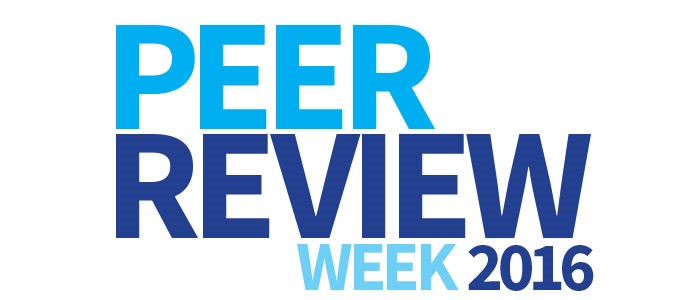

This week is Peer Review Week, a global event to celebrate and debate peer review. This is the second year the event has taken place and it has expanded to involve over 20 organizations with an interest in peer review. You can read more on the Peer Review Week website and by following #PeerRevWk16 on Twitter. This year's theme is Recognition for Review, exploring all aspects of how those undertaking peer review could be recognized for their contribution.

The week includes webinars, videos, interviews and other social media activities on various aspects of peer review and there is also a curated list of resources for peer reviewers, including how-to guides, tutorials, best practice recommendations, guidelines and research.
Many discussions about peer review seem to focus on its failings or what hard work it is for everybody involved, and if you do a Google search for “problems with peer review” you’ll find plenty to read. While some view peer review as an outdated, expensive, ineffective process that slows down science and may introduce bias, surveys of authors, editors and reviewers consistently show that peer review remains a valued part of scholarly communication, while acknowledging a need for training and credit. For those seeking good-quality evidence, there is little on the benefits or harms of peer review. Even explorations of the more testable components of the peer review process generally conclude that more research is needed. But initiatives such as PEERE are seeking to address that.
Furthermore, editors and publishers are tasked with uncovering increasingly sophisticated manipulation and abuse of the peer review process, as researchers seek peer-reviewed publications, which remain the currency of academic standing. This prompted the publication of the World Association of Medical Editors’ best practice for editors, which includes a section on how to identify fraudulent peer review, and the Committee on Publication Ethics’ ethical guidelines for peer reviewers, which includes a list of principles to which peer reviewers are expected to adhere.
So, what about peer review for Cochrane Reviews? Cochrane has not published a formal policy on peer review. Each of the 52 Cochrane Review Groups organizes its own peer review process to suit their field, methodology, resources, and working preferences. This variation can be viewed a strength, as it allows flexibility, but the process also needs to be transparent to users of Cochrane evidence, and also evidence-based where possible.
Earlier this year the Cochrane Editorial Unit convened a peer review advisory group, following an exploratory workshop at the 2015 Cochrane Colloquium. The advisory group represents various roles within Cochrane groups, and has helped us to develop a Cochrane-wide policy on peer review. The group was asked to consider and comment on the best practice for peer review in a Cochrane context, including procedural aspects, such as recommendations for the use of named versus anonymous peer review, the number and type or peer reviewers, and when to peer review updates, as well as expectations for the conduct of Cochrane peer reviewers and options for acknowledging peer reviewers. We also need to highlight the involvement of consumers in the peer review process.
The aims are to provide guidance and support to the editorial teams managing peer review and to peer reviewers, and to provide transparency about the process to readers of Cochrane Reviews. The proposed policy will be shared with the wider Cochrane community for consultation in the near future.
Developing and publishing a policy is only part of the work. Our next focus will be to work with Cochrane Review Groups to support them in implementing the policy. With this in mind we recently conducted a survey of Cochrane Review Groups to inform the implementation phase and identify where additional resources will be required. We are grateful to all those who took part in the survey, and we will be sharing some of the findings at a presentation on peer review at the forthcoming Cochrane Colloquium. One finding from the survey was that there are limited options for recognizing the contribution of Cochrane peer reviewers, beyond inclusion on an annual 'thank you' list. Should we be finding more creative ways to recognize the contributions of peer reviewers, especially as Cochrane Reviews are generally longer and more methodologically complex than many journal article? And, as the peer review landscape is changing, do peer reviewers expect more recognition? We’d welcome your comments on this topic, and we’ll also be tuning in to Peer Review Week 2016 to find out more.
John Hilton
Editor, Cochrane Editorial Unit
Bryony Urquhart
Editor, Cochrane Editorial Unit

